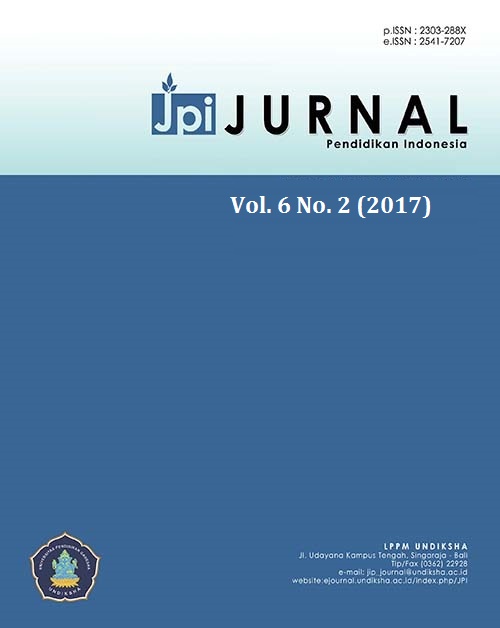Students' Comprehension about the Concept of Light through Generative Learning Model
DOI:
https://doi.org/10.23887/jpi-undiksha.v6i2.11913Keywords:
model generative learning, pemahaman konsepAbstract
This study aims to determine the effect of generative learning model on the students’ conceptual understanding on Lights subject matter. This type of research is pre experimental study with One Group Pretest Posttest Design. The population of this research is all students of class VIII in SMP 5 Singkawang city. The sample of the research is the students of class VIII E which amounted to 20 people and the sampling technique using simple random sampling. The research instrument used in the form of multiple choice test. Data were analyzed by using paired t-test. From the calculation results obtained value -tcalculation < -ttable ie -59,73 < -2,093, then H0 rejected and Ha accepted at the level of significance α = 0,05. So it can be concluded that there is influence of generative learning model to students’ concept understanding on lights subject matter.
References
Arikunto, S. 2010. Dasar-dasar Evaluasi Pendidikan. Jakarta: Bumi Aksara.
Flick, L. B. 1996. Understanding a Generative Learning Model of Instruction: A Case Study of Elementary Teacher Planning. Journal of Science Teacher Education. Jilid 7, No. 2.
Osborne, R. & Wittrock, M. 1985. The Generative Learning Model and Its Implications for Science Education. Studies in Science Education. Jilid 12, No. 1.
Ritchie, D. & Volkl, C. 2000. Effectiveness of Two Generative Learning Strategies in the Science Classroom. School Science and Mathematics. Jilid 100, No. 2.
Rosdianto, H., Murdani, E., & Hendra. 2017. The Implementation of POE (Predict Observe Explain) Model to Improve Student's Concept Understanding on Newton's Law. Jurnal Pendidikan Fisika. Jilid 6 No. 1.
Rosdianto, H. 2017. Pengaruh Model Generative Learning Terhadap Hasil Belajar Ranah Kognitif Siswa Pada Materi Hukum Newton. Jurnal Pendidikan Fisika dan Keilmuan (JPFK). Jilid 3, No. 2.
Subana, M. S. 2011. Dasar-Dasar Penelitian Ilmiah. Bandung: Pustaka Setia.
Sugiyono. 2007. Statistika Untuk Penelitian. Bandung: Alfabeta.
Sugiyono. 2012. Metode Penelitian Kuantitatif, Kualitatif Dan R&D. Bandung: Alfabeta.
Downloads
Published
Issue
Section
License
Authors who publish with the Jurnal Pendidikan Indnesia agree to the following terms:
- Authors retain copyright and grant the journal the right of first publication with the work simultaneously licensed under a Creative Commons Attribution License (CC BY-SA 4.0) that allows others to share the work with an acknowledgment of the work's authorship and initial publication in this journal.
- Authors are able to enter into separate, additional contractual arrangements for the non-exclusive distribution of the journal's published version of the work (e.g., post it to an institutional repository or publish it in a book), with an acknowledgment of its initial publication in this journal.
- Authors are permitted and encouraged to post their work online (e.g., in institutional repositories or on their website) prior to and during the submission process, as it can lead to productive exchanges, as well as earlier and greater citation of published work. (See The Effect of Open Access)








